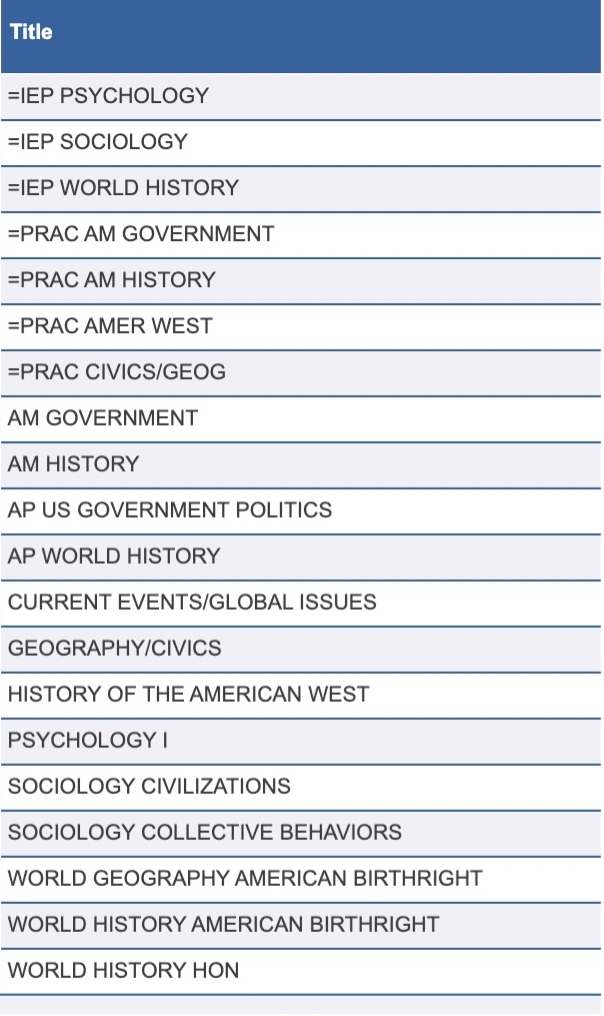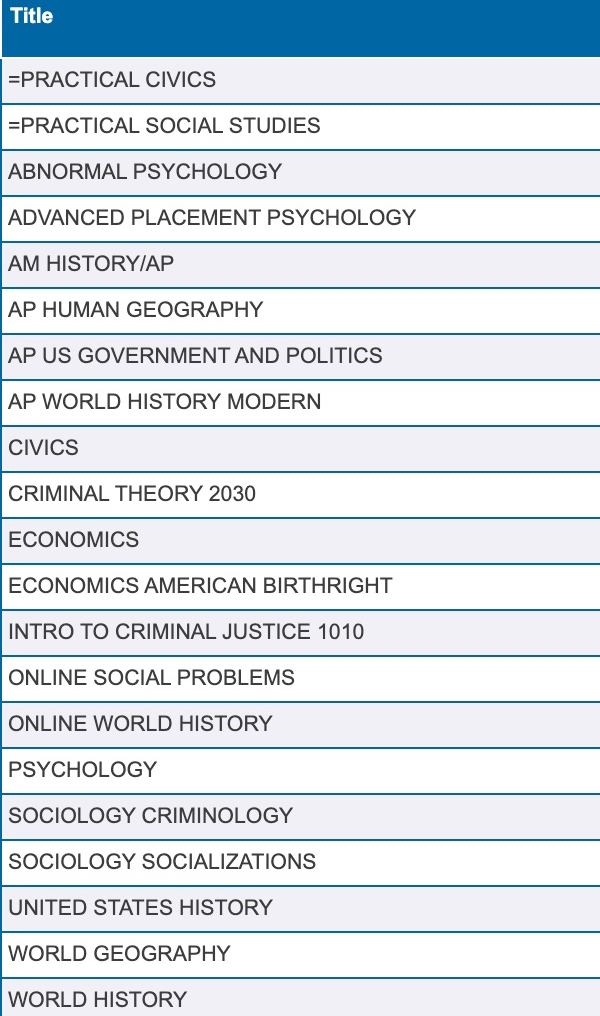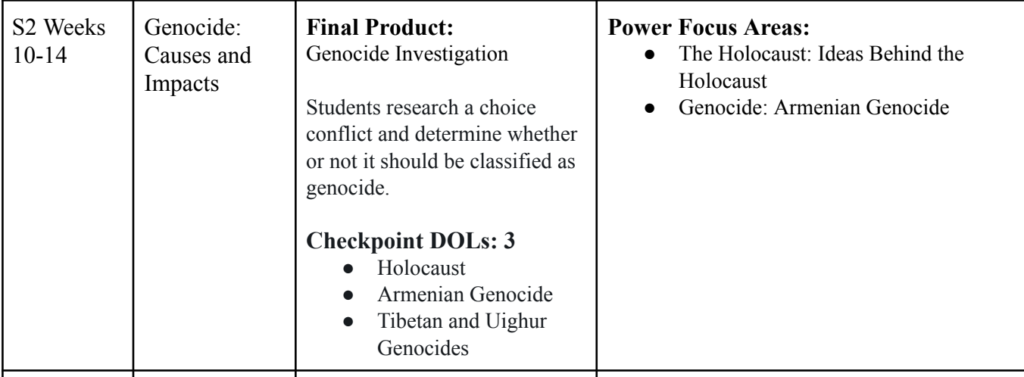Earlier this month, the Woodland Park School District issued a press release thanking the National Collegiate Athletic Association (NCAA) for “recognizing the value and merit of the American Birthright standards implemented at Woodland Park High School.”
The district’s high school had submitted three updated social studies syllabi incorporating the American Birthright standards, World History, World Geography and Economics, to the NCAA, which requires schools to prove specific core courses adequately prepare student-athletes for college-level coursework. Each time a course’s content or curriculum changes, schools must re-apply for accreditation.
The NCAA’s approval marked a victory for Superintendent Ken Witt and American Birthright proponents on the school board. Witt had faced scrutiny from parents in the district that adopting the controversial standards could cause its social studies courses to lose NCAA eligibility. The fears prompted the district to send a letter to families in October accusing community members of starting a “campaign of fear-mongering, claiming that the adoption of the American Birthright standard somehow jeopardizes NCAA accreditation of courses and implies that courses are not meeting Colorado Academic standards.”
The letter says those claims were “patently false.”
The American Birthright standards were developed by the Civics Alliance coalition, a collection of conservative groups that includes Moms 4 Liberty, the American Heritage Education Foundation, the American Freedom Alliance, and the Center for the American Way of Life.
When the Times Recorder first requested an interview with an NCAA representative on Jan. 25th, all three of the new social studies showed as “approved” in a search of the NCAA high school course eligibilty system.
However, when the Times Recorder ran another search of Woodland Park High School’s NCAA-accredited courses on Jan. 30, the status of the American Birthright World History and World Geography courses had changed from “approved” to “archived.” The Economics American Birthright course remains approved.
According to an NCAA customer service agent, only a representative of the school can archive a course, which means the program is no longer offered. Choosing to archive a course won’t affect eligibility for students who are currently taking the course. However, archived courses won’t be eligible for credit once the term ends. The agent also noted that the World History and World Geography courses without the American Birthright descriptor were approved in a prior year.


The district hasn’t announced any changes in the courses’ status and did not return a request for comment by the time this article was published.
Does NCAA approval equal American Birthright endorsement?
Woodland Park’s implication that the NCAA’s approval equals NCAA endorsement is contrary to a confusing NCAA legal disclaimer that states, “The list of approved courses does not, nor is intended to, signify accreditation, certification, approval or endorsement of any high school or specific courses by the NCAA.”
Yet, NCAA-approved courses are allowed to use the NCAA eligibility logo, which signifies at a glance that the program meets its core curriculum criteria and is far easier to find than the legal disclaimer buried within an NCAA website search.
The NCAA only requires high schools to submit a course outline, a comprehensive list of course assignments, and a list of all textbooks, books and resources used. The NCAA policies and procedures guide states that an approved course must include the application of knowledge through higher-order thinking and skills.
The NCAA wouldn’t respond to requests for information about how in-depth reviewers go when approving courses, so it’s unclear what, if anything, the reviewers know about the politically motivated standards.
Red flags in the American Birthright-based outlines
A basic review of the syllabi Woodland Park submitted for world history and world geography raised numerous red flags for Christopher Martell, a professor of social studies education at the University of Massachusettes. Martell helped develop the state’s history framework and is currently part of a research study on the role of politics in state standards development.
“There are some concerning items, such as starting world history with Martin Luther’s religious ideas rather than starting with a global review of world religions, asking if Napolean was a hero or a tyrant, stating humankind started in the Middle East, or emphasizing that the Middle East is important because of oil,” said Martell.
“Their world geography syllabus essentially reads like what the American Birthright suggests should be world history, which separates out Western civilization and Europe from the rest of the world. This is something that goes back to the late 1800s and conservative, white supremacist thinkers of the time.”
Martell also found it odd that the world history class outline doesn’t discuss the Holocaust during the unit on World War II, but instead seems to have intentionally tacked it on to the last few weeks of the course. As a teacher, Martell said it’s common to get behind when teaching a course, and end-of-semester units get dropped off.
The outline also asks students to “research a choice conflict and determine whether or not it should be classified as a genocide.”

“The Holocaust is what led to the United Nations’ definition of genocide. So yeah, there’s a whole bunch of troubling things with their approach to genocide education,” said Martell.
Martell acknowledges it could be challenging for someone without an educational background to read a course description based on American Birthright guidelines and understand the subtext.
“Everyone wants to have pride in their nation and to learn about important thinkers,” Martell said. “But I think anybody with expertise who looks at it can read the subtext right away, particularly the emphasis on using the standards as a tool to redirect what should be taught and how it should be taught.”
Furthermore, the National Council for Social Studies, the country’s largest professional organization devoted exclusively to the teaching and learning of social studies, determined “that the suggested social studies standards developed by the Civics Alliance do not align with best practices for developing social studies standards. If implemented in schools, these suggested standards would have damaging and lasting effects on the civic knowledge of students and their capacity to engage in civic reasoning,” wrote the NCSS in 2022.
The NCSS also states that “diversity, equity, and inclusion guide the policies, procedures, and educational practices of NCSS as we engage in collaborative action that values differences and includes underrepresented voices to promote a holistic understanding of humanity, cultures, and the world around us.”
In direct opposition to the NCSS, American Birthright takes the stance that teaching “action civics, so-called “anti-racism,” civic engagement, critical race theory, current events learning, inquiry-based learning, media literacy, project-based learning, social-emotional learning, and virtually any pedagogy that claims to promote “diversity, equity, and inclusion” or “social justice” inhibits student learning.
Even scarier for Martell is the emphasis on rote memorization and a singular view of history as a means to learning where our liberty came from and tracing how we got that liberty on a world map.
“This is an attempt by a group that’s claiming teachers indoctrinate students. Yet, their guidelines intentionally indoctrinate students by keeping them from making up their own minds, which is really what education is about,” said Martell.
American Birthright vs. Colorado Social Studies Standards
When Woodland Park became the first district in the country to adopt the American Birthright standards, Witt and other administrators knew from the beginning that they didn’t meet the state’s newly adopted standards.
In an email to Kim Moore, Woodland Park’s chief academic officer, about the NCAA approval status, high school principal Karen Hamlow admitted, “As you know, the Birthright Standards do not meet state of Colorado standards nor national standards, so we will need to do significant work to make sure our courses are robust.”
Yet the only difference between the ‘22-’23 World History syllabus and the ‘23-’24 document is the addition of the four-week unit titled Genocide: Causes and Impacts, which the updated state standards require.
Jeremy Meyer, director of communications for the Colorado Department of Education, confirmed that Witt had assured the state that the district’s standards would meet or exceed expectations. “In addition, the Woodland Park superintendent has stated that he does not intend to depart from the Colorado Academic Standards,” said Meyer.
When asked if the Dept. of Education has a method to ensure districts follow through on their word, Meyer said, “There are 178 school districts, the Charter School Institute and eight BOCES. And there are 16 standards – one for each grade level. Districts are expected to frame their curricula around those standards. The legislature has not directed CDE to spend resources checking each school district’s curricula.”
Witt hires associate to conduct independent review of social studies content
In March 2023, Witt hired Lis Richards, owner of Helping Schools Thrive, a business that consults with districts regarding curriculum instruction, to independently review the district’s social studies content as requested by the district’s school board.
Lis Richards serves on the board of Education ReEnvisioned BOCES, where Witt is the executive director, and Witt serves as a reference for Richards on her website. Her website also lists a referral from Brandon Ewing, Education Program Development, Prager U Kids, Incorporated.
The Americans United for Separation of Church and State, a national non-profit including religious and non-religious members, announced an investigation into PragerU last October, calling it “a conservative organization that exists to disseminate often-misleading propaganda to children” and noting that its videos advance a Christian Nationalist viewpoint. The Times Recorder has previously reported on Colorado Republican state senate candidate Tim Walsh’s funding of a series of biased American history videos produced for Prager U by conspiracy theorist Dinesh D’Souza.
Richards did not respond to a request for comment regarding her prior connection to Witt.
In her review, Richards states, “American Birthright Standards cover the required Colorado Academic Standards in Social Studies, with the exception of the subsection – Personal Financial Literacy for High School.” She notes that financial literacy is only “loosely covered” in American Birthright and teachers can choose to supplement in this area.
She also notes that “unlike the Colorado Academic Standards, American Birthright avoids including skills and concepts as they believe including them makes standards unreadably complex for Social Studies.”
Colorado’s High School history skills include:
- Make predictions and design data/information collection and analysis strategies to test historical hypotheses (Critical Thinking and Analysis, Data Literacy).
- Apply knowledge and skills to implement sophisticated, appropriate, and workable solutions to address complex global problems using interdisciplinary perspectives independently or with others (Global and Cultural Awareness, Creativity and Innovation).
Colorado’s standards also address a 2019 state law meant to “ensure that the history, culture and social contributions of minority groups, including African Americans, Latinos, Indigenous peoples, Asian Americans, Hawaiian/Pacific Islanders, and lesbian, gay, bisexual, and transgender individuals were recognized in Colorado’s history and civics standards.”
The standards state, “the inclusion of diverse narratives in history and civics is intended to provide a broad understanding about the stories of all groups and individuals who have contributed to the development and enduring legacies of the United States. Furthermore, it is important that all children in classrooms across Colorado feel respected, included, and are treated with dignity. The social studies standards are premised on this common value.”
Yet, Richard’s review of Woodland Park’s social studies content indicates a lack of dedication to including diverse narratives. For example, Woodland Park’s 5th-grade history learning standards ask students to:
“Identify some of the major leaders and groups responsible for the founding of the religiously diverse original colonies in North America.
a. Lord Baltimore in Maryland (Catholic)
b. William Penn in Pennsylvania (Quaker)
c. John Smith in Virginia (Anglican)
d. Roger Williams in Rhode Island (broad religious tolerance)
e. John Winthrop in Massachusetts (Puritan)”
Each of the listed examples is a White male. By contrast, the Colorado standards ask students to:
“Identify and describe the contributions of significant individuals and groups of Indigenous Peoples, enslaved individuals, and European colonists through the American Revolution. For example: Crispus Attucks, Sybil Luddington, Benjamin Banneker, Thomas Jefferson, and Patrick Henry.”
Woodland Park did not respond to a request to comment on how its schools are addressing the requirement that graduates be able to analyze historical periods through multiple perspectives, within and among cultures and societies.




